![]()
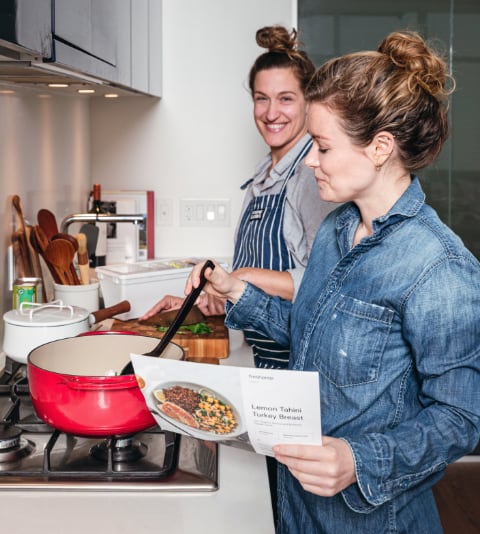
Meal kits have found a place in the marketplace because they make home cooking easy and convenient. But they have a higher environmental footprint than traditional grocery shopping. A new zero waste approach by Fresh Prep allows customers to enjoy the convenience of meal kits while being sustainable, all without added costs.
Every year Canadians throw away 3 million tonnes of plastic waste. About 29,000 tonnes of plastic finds its way into our natural environment. One culprit can be found in the increasingly popular meal delivery kits. These kits usually come with separate ingredients wrapped in single-use plastic and housed in a cardboard box with non-recyclable plastic ice packs.
 Childhood friends Dhruv Sood, Becky Brauer, and Husein Rahemtulla started Vancouver-based meal kit company Fresh Prep in 2015 with a mission: to create a sustainable solution to food preparation. They were determined not to add to the widespread packaging problem that they’d found in common meal kits, which consist of large cardboard boxes, excessive use of single-use plastic, insulation, and over 6 pounds of ice packs, all to be thrown away by customers every week. They knew they had to look beyond the take-make-waste extractive industrial model of meal kits and find ways to adopt a circular economy, one that aims to redefine growth and focuses on positive social change. Sustainability was the destination and that journey started with packaging.
Childhood friends Dhruv Sood, Becky Brauer, and Husein Rahemtulla started Vancouver-based meal kit company Fresh Prep in 2015 with a mission: to create a sustainable solution to food preparation. They were determined not to add to the widespread packaging problem that they’d found in common meal kits, which consist of large cardboard boxes, excessive use of single-use plastic, insulation, and over 6 pounds of ice packs, all to be thrown away by customers every week. They knew they had to look beyond the take-make-waste extractive industrial model of meal kits and find ways to adopt a circular economy, one that aims to redefine growth and focuses on positive social change. Sustainability was the destination and that journey started with packaging.
One of their first experiments was using coin envelopes found at the dollar store for package. But it wasn’t long before quinoa leaked out of the corners. They looked into mason jars. But sending over a dozen mason jars for every meal (although it was working out for mason jar sales at Canadian Tire) wasn’t working operationally for Fresh Prep, nor its customers. Getting a good seal became the three friends’ kryptonite.
While the intent was still there, the co-founders realized that instead of having a handful of people achieving zero waste perfectly it’s better to have millions of people doing it imperfectly. Until they can develop a full solution, plastic was used on items with a leak risk.
Fresh Prep launched with reusable cooler bags, reusable ice packs and compostable brown paper bags. Customers can rinse single-use plastic packaging and return them to Fresh Prep. To date, the Certified B Corporation has diverted over 100,000 kg of soft plastics from landfills. Fresh Prep’s position as a sustainable meal kit company grew.
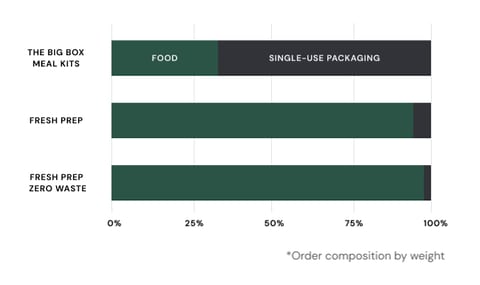
To reduce the footprint even lower, a team of engineers spent three years on research and development to resolve the industry’s packaging problem. The result was Fresh Prep’s Zero Waste Kit.
Each Zero Waste Kit saves around 19 grams of single-use plastic compared to its non-Zero Waste packaging. At scale, if all Fresh Prep customers regularly ordered Zero Waste Kits each week, the company would divert over 500 kg of soft plastic waste per week. That’s the same as the weight of a mini caravan!
Designed for convenience, made for sustainability, the Zero Waste Kit is delivered in Fresh Prep’s signature reusable and insulated cooler bags, all parts of the kit are made with BPA-free reusable plastic and silicone parts. Ingredients come pre-portioned in an easy-to-use tray for less waste and a more convenient cooking experience. Customers simply leave their cups in the container and orient the kit to look the same as the recipe card image to begin cooking conveniently and sustainably.
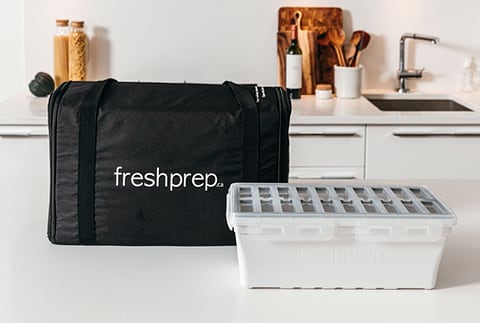

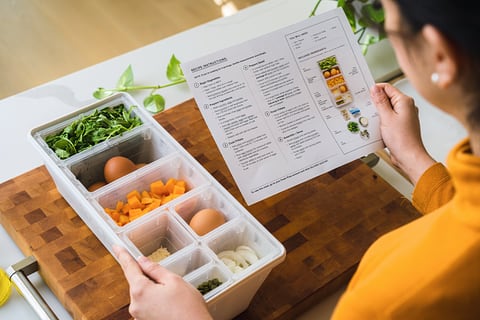
Meals delivered in the Zero Waste Kit have no additional charge for the customer compared with meals in non-zero waste packaging, despite an increased cost for the company. Innovating in this way is an example of a cost Fresh Prep is willing to take on as a responsible and sustainable business.
With the Zero Waste Kit customers can now enjoy the convenience of a meal kit delivery service while being sustainable. Through these initiatives, Fresh Prep aims to build a valuable company while ensuring that short-term interests do not come at the cost of sacrificing a vision and impact on society.
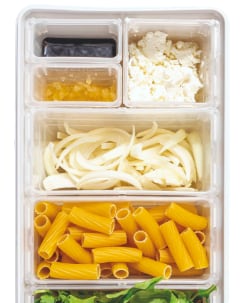 The meal kit company has made good progress in its sustainability goals. The kits are prepared and packaged locally, with over 75% of ingredients and add-on items supplied by local companies. With the Zero Waste Kit, customers can expect to receive the same locally-sourced, high quality ingredients paired with chef-quality recipes that Fresh Prep is known for at the same price as before. In the future, Fresh Prep’s co-founders want to see more government incentives for businesses to find ways to innovate with reusable packaging solutions. It takes extensive time and money to create such solutions and they believe it would be great to have support to push this type of innovation further.
The meal kit company has made good progress in its sustainability goals. The kits are prepared and packaged locally, with over 75% of ingredients and add-on items supplied by local companies. With the Zero Waste Kit, customers can expect to receive the same locally-sourced, high quality ingredients paired with chef-quality recipes that Fresh Prep is known for at the same price as before. In the future, Fresh Prep’s co-founders want to see more government incentives for businesses to find ways to innovate with reusable packaging solutions. It takes extensive time and money to create such solutions and they believe it would be great to have support to push this type of innovation further.
Sustainability and minimizing packaging is something the whole industry needs to address. Fresh Prep hopes to see others in the industry take on environmental issues through initiatives in ways that make sense for their business. There is a better way to do business. It’s not about promising an unattainable vision or making grand commitments. It’s about offering practical solutions that offer an easier home cooking experience without the added cost or environmental footprint. Going forward, Fresh Prep will continue in its journey to adapt and offer initiatives that ensure it is playing our part in creating a sustainable future for us all.
This article on how to be a responsible corporation is sponsored by Fresh Prep, whose vision is to push the meal kit industry towards a more sustainable future, through embedding sustainability practices within their business model.
